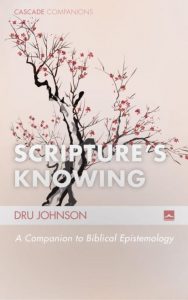Scripture’s Knowing (Dru Johnson, 2015)

A study in biblical epistemology
Perhaps now more than ever, in a year filled with a pandemic, economic upheaval, racial reckoning, and an upcoming election, the choices we make in daily life are driven by who we believe as much as what we believe. Dru Johnson’s Scripture’s Knowing is helpful in this moment when many people are questioning authorities, sources, and institutions.
Johnson examines biblical texts through a philosophical lens in order to glean a pattern of “knowing” in scripture. He shows how biblical authors portray the process of knowing and broadly defines “knowing” as “skill gained through a guided process in order to see” (p. 5). To know well we must “trust authorities and embody their directions in order to know” (p. 32). Johnson argues that this biblical process is meant to be applied to all of life from “knowing” in matters of faith to “knowing” in matters of the physical world. The only difference between good biblical knowing and good scientific knowing “is the way in which trusted authorities gain our trust” (p. 17).
The process of discerning who Christians trust is at the heart of Johnson’s book. He identifies a repeated pattern in scripture of the struggle to recognize proper authority beginning with Adam and Eve in the Garden: Who do you trust, your Creator or the snake? Johnson works his way through parts of the Bible—Creation, the Exodus, and the Gospel of Mark—and extracts principles on the relationship between knowledge and trust in authority. These themes are helpful as we attempt to navigate through a multiplicity of voices in today’s world, as many discount the value of authorities.
Johnson shows there is a choice between good authority vs. bad authority, rather than between good authority vs. non-authority. Stated differently, scripture offers no examples of a “neutral position of independent learning” (p. 104). In deciding who to believe, Johnson shows that every individual submits to some authority. Knowing is a fundamentally relational process. In highlighting the relational dynamic, Johnson leads us in asking, “Who or what do we trust in the process of knowing?”
The biblical pattern of knowing reveals our tendency toward individualistic patterns of knowing—often rooted in a desire to “do our own research” or objectively uncover the truth on our own. But biblical knowing is always meant to be done in the community of the church and actually is in conflict with the idea that Christians should simply figure out knowledge for ourselves. Not only is individualistic knowing problematic but knowing primarily on a social media platform or within a political party is fundamentally different than the practice of knowing as the church. Scripture’s Knowing is valuable in assessing our current struggles in this area in the way it sheds light on both the right and wrong ways of knowing.
Particularly relevant to this moment in history, Johnson asserts that the pattern of knowing in scripture is not about finding a unique fact or piece of data. Rather,
Examining the event without process can create problematic knowledge. Problematic because they have little regard for the human body, community, and process in which they are bound up. For those interested in biblical discourse, the ancient authors of scripture regularly maintain the connection of the embodied person in her community struggling to understand reality over the course of time (4).
Scripture’s Knowing can be read in community—discussion questions are provided at the end of each chapter. Johnson shows the scriptural pattern of knowing to be slow and difficult and rarely clear. It is the opposite of a deep dive into the Internet. Rather, it is a call to learn together in community and to form better habits of trust and action.
Copyright © 2020 Jennifer Asp
Book recommended: Scripture’s Knowing: A Companion to Biblical Epistemology by Dru Johnson (Eugene Oregon: Wipf & Stock; 2015) 152 pages.
Jennifer Asp is the Women’s Coordinator at Church of the Cross in Hopkins, MN and is pursuing her Master of Art’s of Theological and Biblical studies at Covenant Seminary. She loves serious Bible study, laughing with friends, and cheering on the MN Twins with her husband and two kids.

